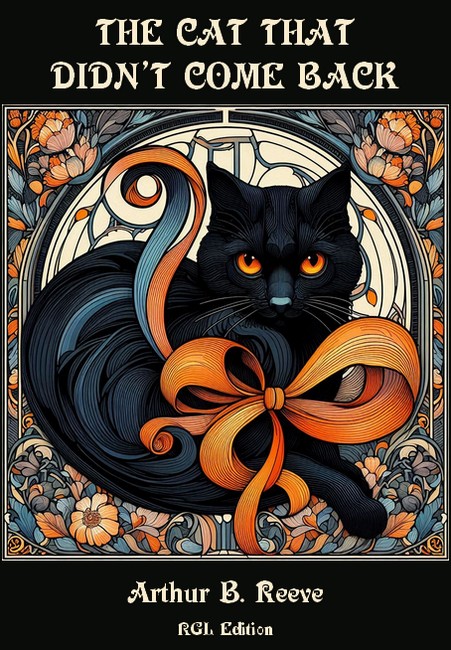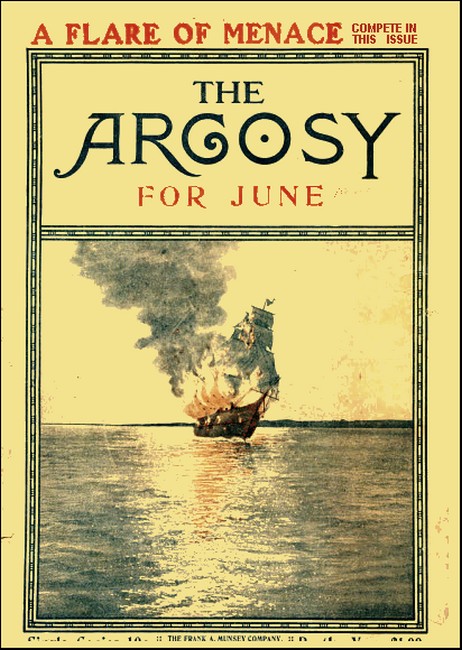
RGL e-Book Cover©
Roy Glashan's Library
Non sibi sed omnibus
Go to Home Page
This work is out of copyright in countries with a copyright
period of 70 years or less, after the year of the author's death.
If it is under copyright in your country of residence,
do not download or redistribute this file.
Original content added by RGL (e.g., introductions, notes,
RGL covers) is proprietary and protected by copyright.

RGL e-Book Cover©


The Argosy, June 1907, with "The Cat That Didn't Come Back"

"WHAT is the matter, dear?" I asked, applying a preparation called New Face which, according to the label, was exactly the thing to save the physiognomy of a commuter whose shaving has put him several minutes behind his schedule for the eight o'clock express.
My answer was a copious shower of tears. Frantically I slapped on another daub of the stuff and anxiously asked whether the cook had again threatened to leave.
Between sobs I heard, "T-t-tiger is d-d-dead. Somebody has poisoned our T-tiger."
Tiger was a beautiful feline study in orange and black that gladdened our loyal Princeton hearts—the black being furnished by Tiger and the orange by a huge bow with which his mistress decorated him when on parade.
I don't remember exactly what I said and perhaps it is just as well, for it so shocked the tears away, that I hastened to add, "Never mind, dear, I'll bury Tiger in the garden and—"
"What, bury poor, dear Tiger in the garden? Not a bit of it. I couldn't bear to look at his grave and think of the heartless creature that murdered him —yes, m-m-murdered him," and the shower began again.
"All right, deary, all right. I'll fix it. Now, don't cry over nothing but a cat."
Of course that was absolutely the worst thing I could have said under the circumstances. I am always saying the worst possible things at the worst possible moments. The shower became a cloudburst.
Obviously the next thing to do was to "sit on the corpse," as it were, there being no cat corner in the shape of a society for the removal of dead pets in Latehurst.
"You must take him away from here," said a mournful voice at my elbow.
In perplexity I looked at my watch. I had already forfeited my breakfast for the poor dead dear, but by haste I could still catch the train.
A brilliant idea flashed into my mind and I dashed into the house to execute it.
With a huge piece of stout paper and yards of heavy string I wrapped Tiger in his shroud with a stone at head and tail to pay his passage on the Styx. The Styx idea had suggested that while crossing the ferry to New York I would accidentally let Tiger fall into a watery grave.
Tiger, then decked out in a gay funereal ribbon, by judicious squeezing soon assumed the outward appearance of a poorly constructed bundle of home-made laundry. With a parting kiss to my wife I took to the open road, Tiger under my arm.
For once both train and myself were late exactly to the moment. I settled myself as obscurely as possible in a seat in the smoker, eying the other occupants out of the corners of my eyes and praying that they would be content to keep to their own newspapers and their own arguments about the train service.
But it was not to be so. Jones, who has just bought a lot as a premium with a set of books, slapped me on the back and asked me how I thought the new tunnels would affect the investment. Even under ordinary circumstances I should have resented taking seriously a book and lot proposition that obligated one for the rest of his natural life or thereabouts to the payment of easy periodical sums.
The circumstances this morning were extraordinary, and I snapped out: "If every house in that tract has a set of those confounded books in it, it is my candid opinion that your lots won't be worth a damaged blue-print of the whole bunch."
Jones was mildly surprised at this tartness in one who usually settled the affairs of the nation before going to the office every morning, and subsided into the market quotations until nearly into Jersey City. Then he chirped up again and I sadly reflected that as he went over on the same ferry I did, it was all off for poor old Tiger that morning.
The result was that I carried that cat up to the office and carefully stowed it away back of some books and papers on the top of my desk pending the return journey home that night.
By reason of a barely perceptible reminder that caused the stenographer to sniff suspiciously I was fortunate enough not to forget my charge when the day closed. Muttering that at last I would officiate at the last sad rites of Tiger or know the reason why, I jostled my way down the narrow streets that lead to Jersey's ferries, keeping my weather eye peeled to dodge any possible acquaintances who might put a damper on the proceedings.
As I hurried down the slip I saw to my chagrin that even the stern of the boat was crowded. Could I hope not to be hailed by some acquaintance with the latest story commuters are wont to tell? Even if I was not, how could I summon courage to pitch a suspicious-looking parcel nervously overboard in the semi-darkness as if I were a murderer disposing of his crime in sections?
I noted that the upper deck was almost deserted, and with the utmost dexterity and abandon I swerved across the horseway and into the ladies' cabin, hoping to gain the stairs before I was detected. There were only two or three on the second deck, and I was congratulating myself on my ready wit that had saved the day when a soprano voice at my side gushed forth:
"Why, how do you do, Mr. Darling, and how is Mrs. Darling, and the little boy, and that perfectly lovely black cat of yours?"
It was Mrs. Watkins-Smith, wife of the president of our country club. There was no avenue of escape except over the rail into the river, and I most certainly did not contemplate going overboard with Tiger myself.
Therefore, for a mortal hour or more I was explaining why Mrs. Darling and I were not playing the game.of golf we used to play, why we had to miss the last bridge party at the club, where we expected to go for the month of August, and what we thought of the Brown-Green engagement that had been kept secret so long. I promised particularly to ask Mrs. D. to be sure to come over to the clock golf tournament on Thursday and remember the mixed foursomes the last week in July.
Meanwhile I had figured out my campaign. On entering the train I had tossed my bundle carelessly up into the rack with little regard as to whether it was over my own seat or not. I viciously said to myself that I would leave it there and let the railroad sweat over that cat.
Mrs. Watkins-Smith left the train at Greenhill. Two fat Germans back of us who had discussed the relative merits of tripe and Hasenpfeffer ad nauseam all the way out, also got off after puffing and blowing at the unwonted effort to reach from the rack the parcels which commuters are proverbially condemned to carry.
Mrs. W.-S. extracted a final promise for us to attend something or other they were planning at the club—year after next, I think—and I accepted without hesitation. Then I settled myself down for a glance at the evening paper until Latehurst was reached.
The train had scarcely stopped before I was light-heartedly out on the platform headed for home, once more a free man. I had hardly reached the street, however, when I heard my name called.
"Mr. Darling, Mr. Darling—didn't you forget your package?"
I turned viciously. It was the conductor hurrying after me with a brown paper parcel.
I didn't even thank him—how could I with such bitterness as was in my heart? I made up my mind to bury that cat so deep that its journey to purgatory would be only a few feet.
At home, I flung down the package on the table in the library and told my story to the uttermost detail. My wife did not seem to be especially interested.
"Do you know, I'd just like to see poor Tiger once more before you bury the dear thing?"
I said nothing, although there was much I could have said, as she untied the string and took off the paper.
"Why, George," she exclaimed, showering the contents with tears, "how could you joke with me? "
I looked over her shoulder before I answered and quickly changed what I was going to say.
There was a rabbit in that package I had brought home.
Roy Glashan's Library
Non sibi sed omnibus
Go to Home Page
This work is out of copyright in countries with a copyright
period of 70 years or less, after the year of the author's death.
If it is under copyright in your country of residence,
do not download or redistribute this file.
Original content added by RGL (e.g., introductions, notes,
RGL covers) is proprietary and protected by copyright.